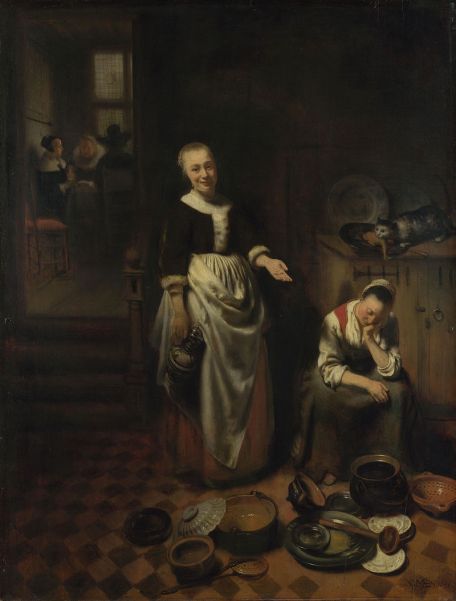Historians have done lots of work in recent years on health and medical care in the family in early modern Britain. As such we know much more about what life was like for the sick in the early modern home, how patients were cared for and by whom. The family provided ready sources of both physical medicines and care.

The Servant, by Wenceslas Hollar (Copyright Shakespeare Folger Digital Images)
As Mary Fissell and others have argued, the burden of responsibility for looking after the sick often fell on women, and could involve a great deal of extra work, such as in washing, preparing medicines and so on. Other historians, such as Lisa Smith (and me!) have also noted the important role played by men in domestic medicine, noting that men were important gatherers and collectors of remedies, and were sometimes forced into a caring role when their wives fell sick – something that early modern medical literature didn’t necessarily prepare them for.
There is one group of patients, however, who sometimes slip through the net. What happened when servants fell sick? Who cared for, and looked after them? How far did employers pay for their care or treatment? In some ways the question might seem redundant. Servants were considered part of the family unit. When Pepys opened his diary in 1660, he noted “I lived in Axe Yard, having my wife and servant Jane, and no more family than us three”. It’s easy to miss the significance of this; Jane, their servant, was fully part of the Pepys family. As part of the family, therefore, they could surely expect to be looked after.

In economic terms it certainly made sense to treat a sick servant, if for no other reason than to return them to productivity as quickly as possible. In large houses or estates, for example, a spate of sickness amongst servants and labourers could be potentially disastrous for productivity. But is there evidence to suggest that care went beyond this purely pragmatic view? Through my work on medicine in early modern Wales, I came across a number of examples.
Surviving records from the account book of William Davies of Clytha, Monmouthshire, certainly suggest that he went beyond the call of duty. In May 1718 he took on a boy, William Prosser, to his service at the wage of two pounds and four shillings per year. Davies was diligent in recording a range of entries concerning his servant. It is clear, for example, that he gave Prosser what might today be regarded as pocket money on occasions. In one instance he recorded giving Prosser 6 shillings to visit Usk Fair. On another occasion he provided 2 shillings for the boy to play cards. He paid for new stockings and the mending of shoes, and allowed Prosser time off to go to Monmouth, and also to visit his sister when she was sick.
Davies, however, also noted occasions when Prosser was himself sick, and the duration. One entry reads “You were sick in Aprill 7 dayes”, and another “you were sick and you lost 11 dayes”. On one level this might be seen as an employer monitoring his servant, and keeping a tally of their sick days…an approach that would not feel unfamiliar in a modern workplace! But, also just like a modern employer, it seems that Davies provided sickpay – “June ye 15th I gave you one shilling when you were sick’. Was this the norm, or was Prosser simply lucky in having an apparently benevolent employer?
There is other evidence to suggest that some were prepared to allow sick employees to move into their households for treatment. The probate inventory of the Cardiff labourer William Cozens shows that, during his last sickness, he was living in the house of his employer, and receiving care. Note that Cozens was a labourer, and not a domestic servant, suggesting that he ordinarily did not live with the family.
Gentry household accounts certainly suggest that provision of medicines for sick servants was routine. The accounts of Lord Herbert, the 9th earl of Pembroke, give a running list of the many preparations and remedies ordered from a London apothecary John Jackson. (Between 1744 and 1747 there were a total of 848 different prescriptions!). Amongst the many for Lord Herbert and his wife, were entries for William Colly and Jenny White, both presumably servants, as well as medicines for the ‘coachman’ and ‘housemaid’.

The coachman at Chirk Castle was another recipient of treatment, involving a ‘botle of physic from Dr Puleston’, and when the ‘boy Thomas was swoll’n under the chin’, an entry in the accounts paid for a man to fetch the apothecary from nearby Wrexham.
R.C. Richardson’s study of servants in early modern England found similar evidence to suggest that employers were usually keen to look after their charges. Those who failed to do so properly were denounced as ‘cursed and hard-hearted persons’ whose threshold the prospective servant should be wary to cross. Preachers, such as William Perkins, considered it the ‘Christian duty’ to care for a servant who ‘In time of his service be sicke’.
Admittedly some were not so sympathetic. Thomas Ffoulkes of Holywell, Flintshire, kept close tabs on his maid, apparently suspicious of her claims to be ill. In January 1724 he noted “My mayd Margarett Jones fell sick this day, and next day, and did not get out of bed. Munday morning, being the 8th, she went unknown to me to her mother’s and did not returne till Friday”. Ffoulkes’s scathing last line “she went rambling home severall other times” suggested he thought that Margarett was pulling the early modern equivalent of a ‘sickie’!
In general, however, sick servants were the recipients of often quite generous levels of care. On one level, as part of the family this might be expected. But these were also, ultimately, employees, and therefore reliant on the goodwill of their masters and mistresses for this to be provided. It would be interesting to find out more about the changing dynamic, when employees had to provide physical care for their servants. Presuming there were no others available, how must it have felt for the mistress of the house to tend the sickbed of her housemaid? Perhaps the subject for a future post.

5 thoughts on “Sick Servants in Early Modern Britain”